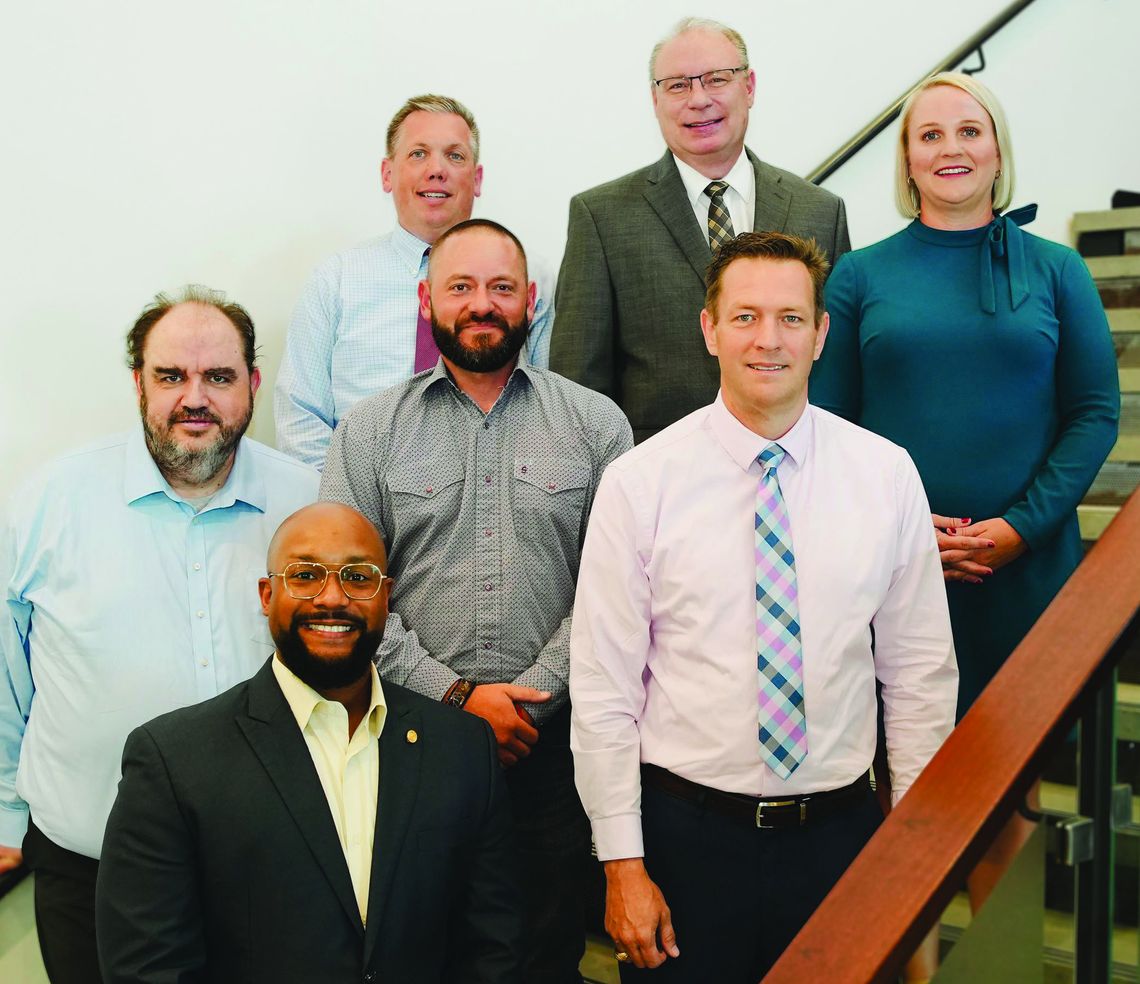GOVERNMENT
Observers of Taylor and Hutto governing bodies say they have noticed a rising tide of disharmony during city council meetings. If the men and women who guide the cities can’t seem to get along, some are wondering whether the business of running the towns can go smoothly?
One councilman, however, said the concerns may be much ado about nothing.
“I don’t think the relationship between the council members is having an effect in getting the work done,” said Taylor Councilman Gerald Anderson. “Every meeting we still get up there, we still get through the agenda, we still vote, we still get things done. The council has always gotten things done. At the end of the day, we don’t have to have a personal relationship to get our job done.”
Yet more often, the record will show council chambers are filled with angry residents ready to speak out and socialmedia posts that openly target the towns’ leaders, going as far as bringing in slurs about their personal lives.
In Hutto, rumors of bullying, racism, gender discrimination and worse by council members have been spread through online groups and occasionally alluded to during meetings.
In Taylor, allegations of badgering the city staff, voting on special interests, threatening to remove board members and obstructing agenda items have led to outbursts and name-calling.
An August council meeting in Taylor called to discuss a council-relations policy to govern better conduct ended up as a chance for members to air grievances against each other.
“There’s no way you can burn a town down, separate a community, walk in the door and then say, ‘Let’s forget about everything and just move forward,’” Councilman Robert Garcia told Mayor Dwayne Ariola. “We can have a policy in place all we want, but if you’re doing things behind the scenes, back doors, it really doesn’t matter if we have a policy.”
Anderson asked whether the policy could address organized groups of residents who spoke during the open-comment period. He charged that Ariola’s supporters had been coming to council over the past three years with an agenda of attacking specific members on the dais.
Ariola did offer an apology, but it was rebuffed. Other council members said it was time to move on.
NOT DYSFUNCTIONAL
Ariola declined to comment for this article, but Anderson said this type of interaction does not mean the Taylor council is dysfunctional.
“I haven’t seen where it has affected our ability to get anything done. Politics is always divisive. It’s nothing new. Especially when you have the growth Taylor is having,” Anderson said, noting multibillion-dollar chip foundry Samsung Austin Semiconductor will be coming online soon in Taylor.
“It’s a lot of growing pains and unknowns that make people react more intensely than they would if we didn’t have a Samsung coming and weren’t trying to change how we’re been doing things the last 100 years,” he added. “The decisions we have made as a council are making this town sustainable and profitable for the next generation and generations to come.”
However, not everyone agrees that all the right things are getting done.
In Hutto, Perry Savard has been a longtime civic activist, serving on advisory boards and commissions and working with numerous members of councils and city staff. He agrees there is always going to be debate, but the current environment is creating an unhealthy division.
“There are people on our City Council

They’re always arguing, they’re always looking for ways to get somebody off
City Council.”
— PERRY SAVARD, LONGTIME HUTTO ACTIVIST

Building a good corporate team or board of directors is the responsibility of leadership.”
– RICK VON PFEIL, BRAVER ANGELS that are more interested in trying to get other people off the council than they are in actually doing what we elected them to do,” Savard said. “It seems like none of them can work together. They’re always arguing, they’re always looking for ways to get somebody off City Council or skirt around the issue and not vote. It’s a mess.
“We need healthy debate. We need people who can say, ‘OK, we don’t agree but the consensus is (x), so we’re going to go ahead and work toward that,’” he added.
He said he has witnessed council members losing a vote and going onto social media to complain.
“The dissension they have on City Council turns into division in the citizenry. We don’t need any more people grabbing onto one issue and running with it without doing any research,” the activist said. “We need a City Council that says, ‘OK, the vote didn’t go my way, what can we do to make this easier?’”
NOT UNIQUE TO CENTRAL TEXAS
Local councils are not alone in this issue. An internet search finds articles about embattled city governments in Austin, Dallas, Houston, San Antonio and spanning the globe all the way to Glasgow, Scotland. The symptoms can show up as strained relationships between council members, between the elected council and city staff or a loss of community confidence in the council.
“Leadership is about somehow getting people with different views to come together and execute on goals and plans they would never agree to on their own. Clearly, that’s not happening in many local governments,” Paul Wolf of GovLoop, a Washington D.C.-based training and research company for government leaders, wrote in an article titled “7 signs your local government is dysfunctional.”
STRIVING FOR CIVILITY
Retired corporate-consultant Rick Von Pfeil is the Taylor ambassador for Braver Angels, a national organization that promotes a return to civil discourse.
“From our Founding Fathers to present-day Congress, from boards of directors at Fortune 100 companies to boards at charities, differences of opinion and competing agendas will often add a few degrees of pressure and temperature to any team no matter how synoptic the goal or mission,” he said. “Good teams are not conjured out of vapor. Building a good corporate team or board of directors is the responsibility of leadership.”
But the leadership has to want to change, analysts said.
Hutto’s Mayor Pro Tem Peter Gordon said some of the toxicity at council gets amplified on the dais.
“I’ve noticed an increase in what I would call hostility in the conversations. It seems to have moved away from policy disagreement to personal attacks,” he said. “It’s a big challenge when the elected officials participate in the attacks or encourage the attacks from their followers. It really distracts from our work, from what we’re trying to accomplish, and it creates chaos in the community.”
Much of the activity originates on social media, and some leaders are not taking steps to ask supporters to tone down the rhetoric, Gordon said.
Mayor Mike Snyder maintains a consistent and casual relationship with his constituency through social media. His posts spark responses that can be negative toward the mayor’s detractors on Hutto’s divided council, but Snyder views that as a symptom of the current environment.
“There is definitely a new sense of conflict like never before,” the mayor said. “I think that many times, people take positions that are for reasons other than they tell the public. Sometimes it seems like personal preferences or some kind of party-political stance.
“We should definitely be able to disagree without all of the back channeling. We should be able to say an opinion without immediately, someone saying that they disagree. We should just let people have opinions that differ,” he added.
GETTING THE JOB DONE
Despite what seems like continual conflict, council members such as Anderson, Snyder and Gordon say they are there primarily to do good work for the communities they love.
“We may not always agree, but in my opinion every elected official is there because they want to have a positive impact on their community,” Gordon said.
“The good news is that dysfunctional teams can be turned around if the leader genuinely wants teamwork, and humbly works towards building it,” said Pfeil, who believes the current city council situations would benefit from professional mediation. “During the Civil War, President Lincoln assembled his cabinet with a ‘Team of Rivals,’ and it is a master-class example of team building with rivals.”
He added, “I have seen experts in team building and mediation, who use both art and science, overcome highly divisive and dysfunctional environments.”
For his part, Anderson doesn’t plan on changing his ways. The outspoken official told fellow council members he is not apologizing for anything he says on social media, and that he always says what he means and means what he says.
“Regardless of what people think of us on a personal level, this city is in the best position of any city in the state of Texas to be prosperous and successful. Period,” Anderson said. “And you don’t have to like me, personally, I don’t care. But I have done a great job as a councilman, and we have done great things for this city. And our children...are going to have the best opportunity in the state of Texas to be successful.”

“At the end of the day, we don’t have to have a personal relationship to get our job done.”
— GERALD ANDERSON, TAYLOR COUNCILMAN

Taylor’s City Council members discuss updating a policy that includes treating each other with respect. COURTESY CITY OF TAYLOR



Comment
Comments